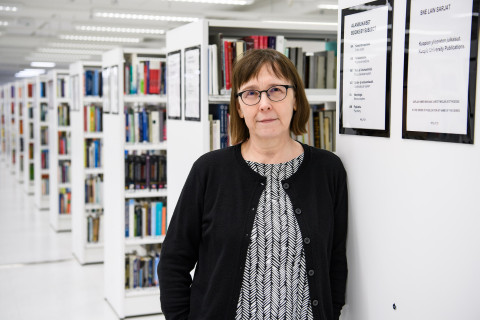Senior Information Specialist Tuulevi Ovaska develops communications at the University of Eastern Finland Library and provides information retrieval support for the academic community.
“I enjoy my work. No two days are alike, and I constantly get to learn new things and develop my expertise. Library work is often considered to involve plenty of routine, and while that too is true, our work also involves plenty of customer service. Like in any specialist role, one gets to use one’s head here,” says Senior Information Specialist Tuulevi Ovaska, describing the scope of work of a scientific library.
The work community of the University of Eastern Finland Library comprises more than sixty specialists who are at the service of students, researchers, teachers and other customer groups on the Joensuu and Kuopio campuses. The tasks and clientele of the scientific library are very diverse: in 2022, the University of Eastern Finland Library had nearly 332,000 visitors.
“Our work community is collegial, and one can always ask co-workers for advice. We are home to a great deal of experience, but we’ve also gained some new, enthusiastic blood. A work community needs a wide range of people – those who do the more traditional library work that requires precision, and those who come up with creative solutions. At best, people complement each other,” Ovaska notes.
Coordinating and developing the library’s communications are at the core of Ovaska’s job description, together with information retrieval guidance and training.
“The library communicates on several channels and on three levels: internal, external and a combination of these. We have approximately 20 different channels, and we create much our content independently in both Finnish and English. That’s a lot of work. At the University of Eastern Finland Library, everyone takes responsibility for communication, each according to their role of course,” Ovaska explains.
In multi-location work, tasks are carried out both remotely and on site. This enables the management of one’s own work, which works well for Ovaska.
“Our work community is one of a single library working on two campuses. We’ve operated online right from the start and our services cross the campus boundaries.”
Printed materials are diminishing as digitalisation changes library work
Ovaska’s path to her current role has involved studies and work in public libraries. She completed a Master’s degree in comparative literature at the University of Tampere in 1990. Her degree included intermediate studies in library science and information science, making it possible for her to work in public libraries for more than ten years.
Over the years, Ovaska became increasingly interested in working in a scientific library. In the late 1990s, she spent one year as a librarian in the information service of the Finnish University Network for Tourism Studies, and in 2002, she participated, in the role of an information specialist, in the Netinformation Project of the North Savo Hospital District. The following year, she started as a librarian in the Medical Library of Kuopio University Hospital (KUH), which constituted part of the University of Kuopio Library. In 2005, Ovaska became an ad interim information specialist at KUH Medical Library, and later an information specialist and the deputy director of the university’s library.
In my current communications role, I need to raise awareness of everything we have on offer, including the things people can’t see in the library. The library is more than a physical space, although that, too, is important. The library is everywhere.
Tuulevi Ovaska
Senior Information Specialist

When the universities and university libraries of Kuopio and Joensuu merged in 2010, Ovaska’s title was changed to Head of Services of KUH Medical Library. In an organisational reform carried out in 2016, the number of heads and other managers of library services was reduced, and Ovaska became a senior information specialist, with responsibility for developing and coordinating the library’s communications.
“Information technology and digital advances, such as online materials and mobile use of services, have significantly changed library work over the years. Right now, artificial intelligence is changing the ways of information retrieval. When walking into a library, one might wonder where all the books are when there’s so little printed material on display. In my current communications role, I need to raise awareness of everything we have on offer, including the things people can’t see in the library. The library is more than a physical space, although that, too, is important. The library is everywhere,” Ovaska points out.
“Thinking is more important than learning to use information retrieval tools”
In addition to doing communication work, Ovaska guides and teaches information retrieval to students, researchers and professionals of medicine, dentistry and related fields. Thanks to her extensive work experience, Ovaska can recognise a good information seeker.
“A good information seeker can conceptualise what information they are looking for, what concepts are related to it, and what terms can be used to describe those concepts. Information retrieval starts with dissecting the topic and the subject. Understanding the process-like nature of information retrieval is important, and one must be critical of what they find. In today’s world, this is increasingly important,” Ovaska says.
Within the academic community, people’s information retrieval skills are diverse. For some, acquiring these skills is easier than for others. Ovaska dispels the misconception that digital natives would naturally know how to seek information in the academic world – typically, they, too, have a lot to learn about scientific information retrieval.
“Thinking is more important than learning to use information retrieval tools. Our role in the library is to assist with information retrieval, references and research data management, and the role of teachers is to teach the content,” Ovaska says.


